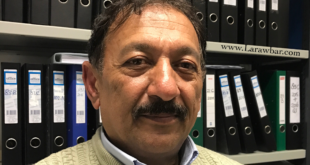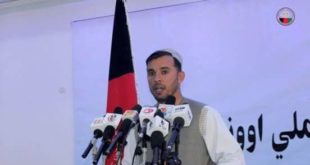Ali Ahmad Jalali
Sunday, March 1, 2009
The Washington Times  We are on the verge of failing in Afghanistan. Seven years into an international mission designed to create peace and stability in the country, Afghanistan has reached a tipping point. Its government’s legitimacy and, in fact, its very existence is openly challenged by an array of insurgent forces.
We are on the verge of failing in Afghanistan. Seven years into an international mission designed to create peace and stability in the country, Afghanistan has reached a tipping point. Its government’s legitimacy and, in fact, its very existence is openly challenged by an array of insurgent forces.
The Taliban, which has long operated a shadow government in Afghanistan’s most dangerous areas, has extended its power to Kabul’s very doorstep, and a weak and corrupt Afghan government is powerless to stop it.
Most Afghans do not view the insurgents as a viable alternative to the current government but are reluctant to stand up to them on behalf of a government that can neither protect them nor deliver basic services.
President Barack Obama is right to say – as he did during his campaign and has in the early days of his presidency – that the United States must exert the effort necessary to win in Afghanistan. He must realize, however, that half-measures or take shortcuts won’t to victory. He will succeed only if he and his administration focus on helping Afghans build a legitimate, stable government that can control its territory and command its citizens’ trust.
Recently, officials both inside and outside the Obama administration have suggested that American policy in Afghanistan will be scaled back and concentrated on preventing insurgent groups from consolidating power inside the country. It would be a mistake for the United States or any of its coalition partners to pursue such a minimalist approach. All progress in Afghanistan – including the defeat of the Taliban, al Qaeda and like-minded groups – hinges on establishing a viable Afghan government
The eradication of violence and terrorism cannot presage establishment of a stable government, but rather a stable government must presage the eradication of violence and terrorism if these gains are to be sustained. Practicable democracy is a prerequisite for America’s successful involvement in Afghanistan and the country’s political future. This requires a long-term commitment. It is an intricate process and it is not cheap.
Now, while it is true that Afghanistan cannot be turned into a “Jeffersonian democracy” or a “Central Asian Valhalla” overnight, it can be realistically transformed into a stable country defined by democratic principles. The fulfillment of such a potentiality will require the Afghan government, the United States, and their coalition partners to forge a shared vision of an end state they are attempting to create in Afghanistan. This vision should be of an Afghanistan able to govern its citizens justly, grow its economy steadily and secure its territory independently.
During the last seven years, efforts designed to stabilize and democratize Afghanistan have failed not because of their infeasibility, but because of the uncoordinated and poorly resourced effort actors have mobilized to support them. Chairman of the U.S. Joint Chiefs of Staff Adm. Michael Mullen neatly summarized the nature of this effort when he told the U.S. Congress in 2007 that “In Iraq, we do what we must … in Afghanistan, we do what we can.” The Obama administration is expected to support “what must be done” in Afghanistan.
Because Afghanistan is a theme park of problems, even with a shared vision actors will be unable to tackle all of the country’s challenges simultaneously. Tasks must be prioritized.
(1) First, actors must tackle the immense security challenges facing the country. Much talk about how to improve Afghanistan’s security situation has centered on three ideas: introducing more foreign troops as part of a “troop surge”; allowing individual Afghan tribes to secure the areas in which they live; and holding peace talks with “reconcilable” insurgent groups. All three ideas are workable, but only if carried out with the best interests of the Afghan people in mind. Afghans will welcome an increased foreign troop presence, as long as it improves their lives.
Victories against insurgents will be meaningless unless they lead to the control of the political and economic space in which the Afghan government can begin to govern effectively, build its indigenous security capacity, protect the population and deliver basic services. Only such an environment will provide a chance for success to other elements of the strategy – namely efforts to win the support of tribes and local communities and incentivize the reconcilable insurgents to make peace deals. If the presence does improve Afghans’ daily lives, the people will associate foreign troops with bombings, raids and civilian casualties and push back against them.
(2) Actors must strive to improve the efficacy of governance in Afghanistan. An over-centralized government in Kabul and incapable administrations in the country’s peripheries are now divided politically, fiscally and administratively. Neither is able to protect the population, create jobs or deliver basic services. Power must be harmoniously balanced between the political center and peripheries. Kabul should take the initiative in fighting insurgents, building critical infrastructure, and reforming corrupt national institutions while provincial and district governments and community organizations should take the lead in driving local economies, delivering basic services, and conducting dispute resolution. Such synergy is critical to ingratiating the Afghan government to its citizens, thereby re-establishing its legitimacy.
(3) Actors in this conflict must help the Afghan government – in Kabul and in Afghanistan’s provinces and districts – improve the country’s economy. International actors must work to ensure that the aid they give is coordinated and efficiently and transparently allocated.
Much of the foreign aid currently used to seed the Afghan economy is supply-driven. It is often donated with little thought given to how it can be used to support local Afghan development projects. A full two-thirds even bypasses the Afghan government – much of being absorbed by companies and their subcontractors as inflated operation costs and expatriate salaries and corporate profits.
More efficiently delivered foreign aid should be complemented by policies designed to stimulate Afghanistan’s rural economy. The agricultural sector accounts for 80 percent of the Afghan economy. So, actors should undertake efforts to invest in agriculture and build the infrastructure that will allow Afghan farmers to safely and securely transport their goods to market. Such action will create jobs, reduce Afghans’ dependence on the drug trade, foster trade, and spur sustainable economic growth.
(4) In addressing regional security issues, Afghanistan and Pakistan should be encouraged and helped to apply similar standards in making deals with militant groups operating in their territories. Winning peace by ceding control to militants locally can cost the struggle regionally. Such deals can inspire insurgency in other areas and become a source of wider problems.
At a minimum, the deals give time to militants to regroup and shift their effort against other areas. Pakistan’s previous dealings with the Taliban have only given them the opportunity to increase attacks across the border in Afghanistan and gain more ground.
Afghanistan and Pakistan, along with the international community, must work together in harmony to support local initiatives designed to sow peace and prohibit the emergence of future troubles.
Long-term stability in Afghanistan – and the permanent eradication of terrorist bases on its soil – is attainable only if Afghan and international actors can agree on a vision of an Afghanistan defined by good governance, economic growth and self-perpetuating security – and work together toward its attainment. Actors will fail to achieve such stability if they continue to focus on making temporary gains that do nothing to fix Afghanistan’s fragmented security, political and social structures.
Positively working towards practicable democracy, not dejectedly refocusing on a “new realism,” is the correct strategy that will allow us to win in Afghanistan.
Ali Ahmad Jalali is Afghanistan’s former interior minister (January 2003-October 2005).
 لراوبر ویب پاڼه لراوبر يو افغان – تازه خبرونه
لراوبر ویب پاڼه لراوبر يو افغان – تازه خبرونه



دا څه معنی چي پدې پاسني عکس کښي ورته ليکل سوي دي (The Future USA President of Afghanistan ?) افغان زولانه اولس اوس ژوندی په ګور ننه ايستل کيږي؟